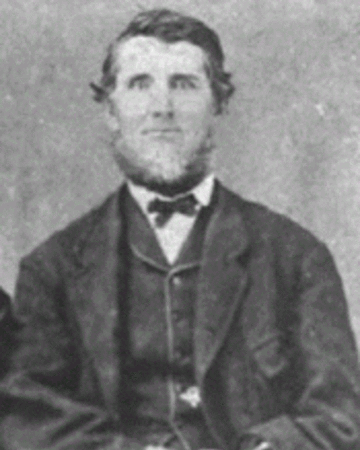Lyman Wight
(1796-1858)


By Susan Easton Black
Lyman Wight, a veteran of the War of 1812, was residing on the Isaac Morley farm when he first heard the message of the Restoration. He accepted the Restoration message and was baptized on November 14, 1830 by Oliver Cowdery. He was ordained a high priest in June 1831 by the Prophet Joseph Smith. Following his ordination, the Prophet received a revelation warning him, “Let my servant Lyman Wight beware, for Satan desireth to sift him as chaff” (D&C 52:12).
Lyman resided among the Saints in Jackson County, Missouri, until being forced by mobs to abandon his possessions and flee across the Missouri River to Clay County. He went with Parley P. Pratt to inform the Prophet Joseph of the suffering of the Saints in Missouri. When volunteers were needed for Zion’s Camp, Lyman journeyed to the states of Pennsylvania, New York, Indiana, Illinois, and Michigan to gather recruits. He was fearless in his defense of Joseph Smith and did not mince words when speaking of the Missourians. Benjamin F. Johnson wrote that Lyman said, ‘“Pray for our enemies,’ that God would damn them, and ‘give us power to kill them.’”1 His explosive comments, such as, “Boys, eat, drink and be merry for to-morrow we—fight,” enraged Missourians and did little to quell the rising hostilities in 1838.2
Lyman was just as bold in declaring doctrine that was not doctrine of Jesus Christ. A Church judicial proceeding was held on August 21, 1834 to investigate his pronouncement that “all disease in this Church is of the devil, and that medicine administered to the sick is of the Devil, for the sick in the Church ought to live by faith.” Another judicial proceeding was held on April 24, 1837 to investigate his teaching that “the Church was under a telestial law, because God does not whip in a Celestial. . . . And that the Book of Covenants and Doctrine was a telestial law and the Book of Commandments were a Celestial law.”3 In both cases, Lyman apologized for his misunderstanding of doctrine and was forgiven but more than one Saint believed, “Lyman Wight, as a bull in the net, is in danger of apostasy, but the Prophet holds on to him.”4
Even with these failings, on June 28, 1838 Lyman was appointed to the presidency of the Adam-ondi-Ahman Stake. While serving in that ecclesiastical position, he was captured and charged with treason and murder by the Missouri militia.
Missouri General Moses Wilson said to him, “Col. Wight, we have nothing against you, only that you are associated with Joe Smith. He is our enemy and a damned rascal. . . . If you will come out and swear against him, we will spare your life.” Lyman replied, “Joseph Smith is not an enemy to mankind, he is not your enemy, and is as good a friend as you have got. Had it not been for him, you would have been in hell long ago, for I should have sent you there, by cutting your throat, and no other man but Joseph Smith could have prevented me, and you may thank him for your life.” General Wilson said, “Wight, you are a strange man, but if you will not accept my proposal, you will be shot tomorrow morning at 8.” Lyman replied, “Shoot and be damned.”5 Lyman’s life was spared, but not from imprisonment. Lyman was incarcerated in Independence, Richmond, and Liberty jails.
In April 1841, Lyman was ordained an apostle of the Lord Jesus Christ. As such, he labored to bring back into Church fellowship two hundred men and women in Kirtland and supervised the cutting of timber in Wisconsin for the Nauvoo Temple. In that remote state, Lyman expressed a desire to preach to the Indians of Texas. After the martyrdom of Joseph Smith, Lyman assured Church leadership that Joseph Smith had called him to go to Texas and establish a mission among the Lamanites.
Brigham counseled him against such a plan. Lyman defied Brigham’s counsel and led about a hundred-and-fifty Saints to Texas. He established a settlement near Austin before moving to the Perdinales River Valley. On December 3, 1848 in the Salt Lake Fort, fellowship was withdrawn from Lyman Wight. He died of an epileptic fit on March 31, 1858 in Dexter, Texas.
1. Letter of Benjamin F. Johnson to George S. Gibbs, as cited in E. Dale LeBaron, “Benjamin Franklin Johnson: Colonizer, Public Servant, and Church Leader,” MA thesis, Brigham Young University, 1967, pp. 325-326.
2. Lyman Omer Littlefield, Reminiscences of Latter-day Saints (Logan, UT: The Utah Journal Co., 1888), p. 61.
3. History, 1838–1856, volume B-1 [1 September 1834–2 November 1838], p. 758. Joseph Smith Papers.
4. Joseph Grant Stevenson, ed., Selections from the Autobiography of Edward Stevenson, 1820–1897 (Provo, UT: Stevenson’s Genealogical Center, 1986), p. 60.
5. Andrew Jenson, LDS Biographical Encyclopedia 4 vols. (Salt Lake City: Andrew Jenson History Company, 1901), 1:95.
Additional Resources
- Biography of Lyman Wight (josephsmithpapers.org)
